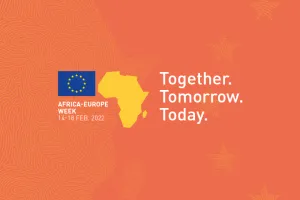Last Thursday, the European Union convened its EU-AU summit with the African Union, welcoming more than 40 African leaders to Brussels. True to the form of the often-shambolic relationship between the two continents, the summit lasted only a single day and was the result of a Covid-induced rescheduling from the original date way back in 2020.
While the brevity may be forgiven, considering Europe has some rather important business to attend to in Ukraine, it’s nonetheless unsurprising. Europe continues to fail to prioritize relations with Africa while China has invested heavily in the development of the continent and their relationships with—and leverage over—leaders there, lending unparalleled sums and helping construct large infrastructure projects like ports, airports, and highways.
While investment in the economies of the world’s youngest and fastest-growing continent should be obvious at any time, if Europe is intent on relaunching its relationship with Africa, now is a particularly crucial moment. Though most American media pay little attention to the continent, we’ve tried to keep the Spectacles audience up to date on the stories affecting democracy in Africa, and, as it turns out, things are not going well there right now.
Last year we covered the widespread riots and shortages in South Africa, the collapse of Tunisia’s young and inspiring democracy, and the Sudanese coup which upended a promising trend towards democratization and improved governance. We wrote that Sudan’s marked the fifth successful coup of 2021—in stark contrast to a worldwide total of three from 2015 to 2020—and we in turn suggested that some of this uptick in disorder plausibly owes itself to the displacement of the influence of pro-democratic powers.
As the highest bidders for desired and necessary investments no longer predicate their involvement on the maintenance of certain democratic institutions and rights, costs for would-be coup-makers go down. The scrupulous investors get the bonus of working with a dictator or tight-knit military junta—more reliable partners than the public.
Current developments in Africa’s Sahel region are exacerbating this trend. I discussed some of this in my article explaining the recent coup in relatively-free Burkina Faso. Since then, however, France has withdrawn its military mission from the region at the request of Mali’s military government—which seized power in a coup last year.
The occasion demonstrates the rift between anti-democratic coup-makers and the west, and it clearly signals the growing risk to democracy on the continent if Europe continues to fail to engage competitively in Africa.
To that end, the brief and much-delayed summit still marks a hopeful moment for European commitment. The EU has promised to launch an extensive marquee investment project to compete directly with Chinese influence, funding infrastructure and green energy construction, among other endeavors.
What remains to be seen, though, is whether the EU will seriously take to heart that they are no longer the only people worth doing business with, that they must compete for Africa’s partnership—not the other way around—and actually deliver on their promises. With a Russian incursion looming in Ukraine, Europe may well become distracted and exclusively focus its geopolitical attention on the east: a sore mistake for freedom and democracy in Africa, especially as the US pivots its attention to the Pacific, leaving African nations open for business and wanting for customers.
Subscribe to Spectacles



Comments
Join the conversation